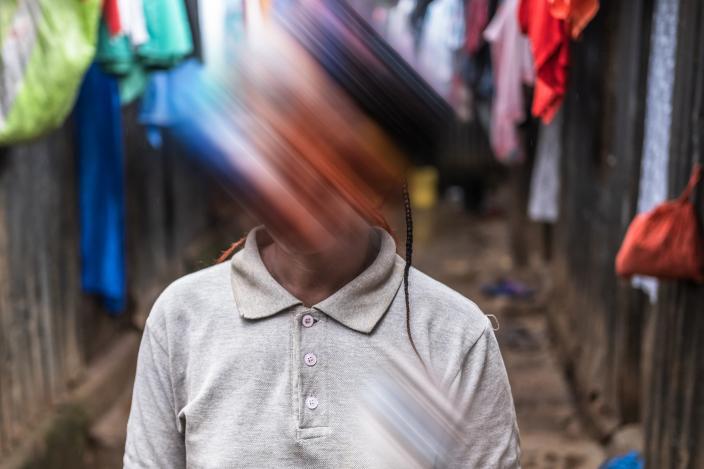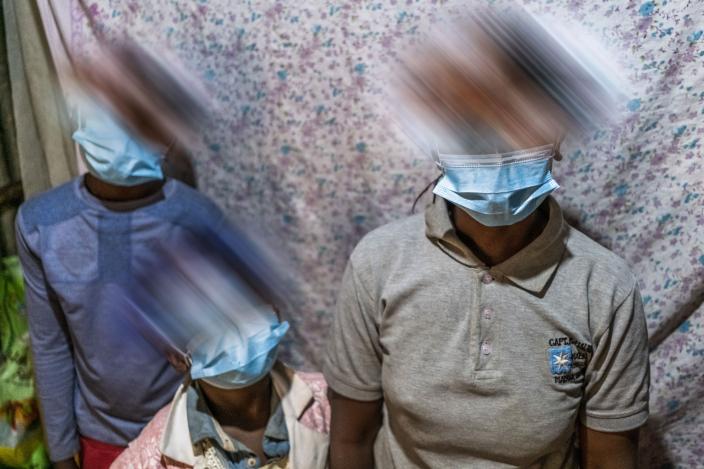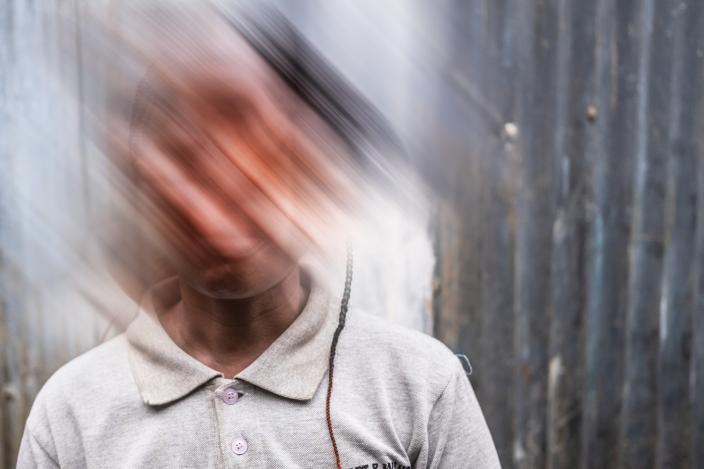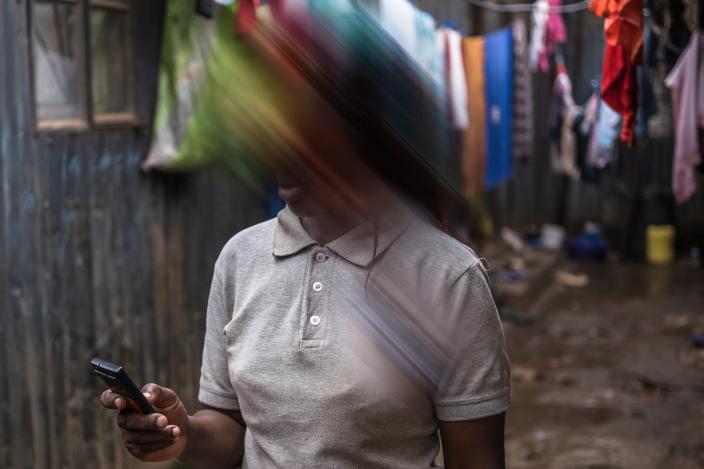How cash transfers helped one survivor find independence, security and peace.
“Later that night, he came home at 3:00am. When I opened the gate for him, he grabbed me by the neck. He said, ‘Get out! This isn’t your house!’, “ recalls 35-year-old Rehema.
A mother of 2, Rehema will never forget the day her husband turned against her, wanting to stab her with a knife. Before the Covid-19 pandemic, Rehema lived with her husband and two children. She worked at a hotel where she earned KSh 250 (€1.98) daily.
Everything changed when the Covid-19 pandemic struck. She lost her job, her husband threw her and her two young children out into the cold, and she was left to fend for her children alone on no income.
This is her recorded testimony, translated from Swahili to English:

Rehema outside her home in Kawangware Informal Settlement, Nairobi. Photo By Brian Otieno / Oxfam in Kenya
“My name is Rehema...
We used to live in a house, together as a family. Life was easier. Their father has a big job – he works as a head chef. He had even bought a car.

David, Rehema’s oldest child, stands outside their home in Kawangware Informal Settlement, Nairobi. Photo By Brian Otieno / Oxfam in Kenya
One day, they announced that a serious disease had arrived in Kenya. Their father came home and asked, ‘Did you hear about the disease?’
Because the hotel I was employed in closed due to the outbreak, their father thought that we would be a burden for him to support.
He said ‘That’s it, I’m not staying here. I’m leaving.’

From left: David, Elaine, and Rehema, standing in their home in Kawangware Informal Settlement, Nairobi. Photo By Brian Otieno / Oxfam in Kenya
I pleaded with him whether he could only rent out his car as a taxi to help us in this challenging time. He told me,
‘So you are directing me? This is my car. There is nothing you can make me do’
I told him I was sorry if I offended him.
Later that night, he came home at 3:00am. When I opened the gate for him, he grabbed me by the neck.
He said, ‘Get out! This isn’t your house!’
He beat me so badly.
My bones still ache. I still cannot do hard work.

Rehema in her home in Kawangware Informal Settlement, Nairobi. Photo By Brian Otieno / Oxfam in Kenya
Then, he picked up a knife.
‘I am ending you with this knife’ - he told me.

Elaine, Rehema’s youngest child, in their family home in Kawangware Informal Settlement, Nairobi. Photo By Brian Otieno / Oxfam in Kenya
Then, my youngest began to cry. She pleaded with him, ‘daddy..’ and she held the knife. ‘Daddy please don’t kill her. Don’t kill her, that's our mum’.
She took the knife from him. I slowly and quietly began to gather our clothes and the children’s bed. We left the house at and stayed outside on the street all night with the children.

From left: David, Elaine, and Rehema, standing in their home in Kawangware Informal Settlement, Nairobi. Photo By Brian Otieno / Oxfam in Kenya
From that point on, it’s been a daily hustle.
Before Covid-19 began, for breakfast, my children would have black tea and mandazi. They would eat lunch at school, and come home to eat dinner.

David, Rehema’s oldest child, stands outside their home in Kawangware Informal Settlement, Nairobi. Photo By Brian Otieno / Oxfam in Kenya
Since the Covid-19 regulations were put in place, everything has gotten really bad. There is no work. These days, if you call potential clients, ‘can I come wash your clothes?’ they will say ‘no, you are bringing me Covid-19’. No one will let you into their homes.

David, Rehema’s oldest child, pictured outside their home in Kawangware Informal Settlement, Nairobi. Photo By Brian Otieno / Oxfam in Kenya
Even if you manage to get KSh 50 (€0.40), you have to budget that. If you buy sugar ¼ Kilo for KSh 30 (€0.24), and Mandazis for KSh 20 (€0.16), that’s it.
There’s nothing left, so you tell the children to drink water for lunch.

Rehema and daughter Elaine walk hand-in-hand a few steps in front of Rehema’s oldest child, David in an alleyway in Kawangware Informal Settlement, Nairobi. Photo By Brian Otieno / Oxfam in Kenya
My youngest is more of a survivor than my oldest. My oldest cries a lot because of these issues. My youngest holds my hand, and she tells me,
‘Mummy, at least we are alive.’
One day, my youngest was sick, and I didn’t have a cent in my pocket.
In desperation, I carried her to WEMA hospital. When we arrived at the gate, the doctor chased me away. He said,
‘Get out, go go!’
I pleaded with him, ‘doctor, please just treat my child’
‘No’ he said. ‘That disease you have is very bad!”
“How do you know we have Corona?” I asked the doctor.
“Go, go go! get out!” He said.
I left with my child crying, complaining about pain in her head and stomach. She was sick for two whole weeks.
Eventually, she recovered on her own slowly and told me,
‘Mum, at least we are alive.’

Elaine, Rehema’s youngest child, in their family home in Kawangware Informal Settlement, Nairobi. Photo By Brian Otieno / Oxfam in Kenya

Rehema navigating the narrow streets of Kawangware Informal Settlement, Nairobi. Photo By Brian Otieno / Oxfam in Kenya
One day, I was on the street looking for casual work. A woman approached me, almost as if she understood my struggle and everything I had gone through. She asked me to come to an office nearby she told me was operated by an organization called CREAW.
‘Please step inside, you will see how much they will help you’ she said.

Rehema inside her home in Kawangware Informal Settlement, Nairobi. Photo By Brian Otieno / Oxfam in Kenya
One day, at about 8:00 pm the end of August, my children and I had just finished our evening prayers, when I heard a message come in on my phone.
Then, my child looked at my phone and told me, ‘Mummy! It’s MPESA’

Rehema recalls receiving the EU-funded safety nets cash transfer on her phone in August. Photo By Brian Otieno / Oxfam in Kenya
I saw that I had received an MPESA transfer of KSh 7,780 (€61.48). I remembered that lady who pulled me into the CREAW office.
I told my children, ‘let’s pray about this’.
We were about to be evicted. That day, the children had not eaten anything at all.

Rehema buys groceries using her EU-funded cash transfer money, at a local market in Kawangware Informal Settlement, Nairobi. Photo By Brian Otieno / Oxfam in Kenya
I immediately took KSh 5,000 (€39.51), and paid our rent. I then bought food and stocked my pantry.

Rehema prepares Mandazi in her home to sell to her neighbours, using the money she received from the EU-funded safety nets programme, in Kawangware Informal Settlement, Nairobi. Photo By Brian Otieno / Oxfam in Kenya
Now, my children eat breakfast with tea and mandazi. They eat lunch, and even supper.

From left: Elaine and David, helping each other wash their hands in their home in Kawangware Informal Settlement, Nairobi. Photo By Brian Otieno / Oxfam in Kenya
Since I received the money, I have been able to buy soap and water. And I even bought a mask (PPE).

Rehema lights her charcoal stove to prepare food for her family in the Kawangware Informal Settlement, Nairobi. Photo By Brian Otieno / Oxfam in Kenya
I sent my sick mother KSh 500 (€3.95), because I am her firstborn. She has high blood pressure and has difficulty walking.

Rehema, standing outside her home in the Kawangware Informal Settlement, Nairobi is now able to afford three meals for her family. Photo By Brian Otieno / Oxfam in Kenya
When I have some money in my hands...

Rehema prepares her children’s schoolbooks for study time –Kawangware Informal Settlement, Nairobi. Photo By Brian Otieno / Oxfam in Kenya
And my children tell me they desire anything, whether it is playing football or singing in a choir in the neighbourhood; if they need shoes or uniforms - I give them everything they desire.

Rehema helps her children study at home so they do not fall back on their education while schools remain closed by the government – Kawangware Informal Settlement, Nairobi. Photo By Brian Otieno / Oxfam in Kenya
Now, they won’t have to think about their dad. Now you find that they come home healthy and happy.

Rehema’s children Elaine (left) and David (right), study at home to stay educated while schools remain closed by the government – Kawangware Informal Settlement, Nairobi. Photo By Brian Otieno / Oxfam in Kenya
Now even I don’t have any worries.

Rehema and her two children, Elaine (left) and David (right), enjoy a hearty meal of Ugali and Sukuma Wiki in their home in Kawangware Informal Settlement, Nairobi. Photo By Brian Otieno / Oxfam in Kenya
If I had more money in my hands…

Rehema scoops food from her plate onto her youngest’s – Elaine; Kawangware Informal Settlement, Nairobi. Photo By Brian Otieno / Oxfam in Kenya
Or if I am finally able to find work, because I am a single parent, I would really desire would to buy a farm, and to own a small business so that I can improve the lives of my children.

Rehema prepares Mandazi in her home to sell to her neighbours, using the money she received from the EU-funded safety nets programme, in Kawangware Informal Settlement, Nairobi. Photo By Brian Otieno / Oxfam in Kenya
Reflecting on my life,
I would advise all women, including married women, to try to put some money aside to keep you going, in case of anything.
Be someone of peace, do your work, hustle, and do everything through prayer.

From left: David, Rehema and Elaine, standing outside their home in Kawangware Informal Settlement, Nairobi. Photo By Brian Otieno / Oxfam in Kenya
Since Corona began, I didn’t know if I would be here with my children, alive today.

Rehema recalls receiving the EU-funded safety nets cash transfer on her phone in August. Photo By Brian Otieno / Oxfam in Kenya
It has been a hard life, but by the power of God, good days come as well.”
Rehema was registered into our @EUinKenya-funded #SafetyNets programme by consortium partner @CREAW. She received KSh 7,780 (€61.48) in August, to help her afford basic necessities, and reduce her vulnerability to the violence faced from her spouse. She will receive two more cash transfers each month thereafter until October.
Her story shows how cash transfers can help reduce the vulnerability of survivors and those at-risk of sexual and gender-based violence, intimate partner violence and other physical risks, by enabling them to build financial resilience and independence and also providing them with a dignified way of fulfilling their basic needs.
Our #SafetyNets Consortium, composed of Oxfam in Kenya, The Kenya Red Cross Society, Concern Worldwide, ACTED, Impact Initiatives, CREAW and the Wangu Kanja Foundation is grateful to the European Union for funding cash transfers to #KomeshaCorona and for coming to the aid of vulnerable Kenyans like Rehema who had nowhere else to turn.
To date, the consortium has transferred Ksh 326,734,040.00 to 16411 vulnerable families, including 621 households that are victims or at risk of sexual and gender-based violence in Nairobi informal settlements. By November, the #SafetyNets consortium will have transferred Ksh 422,558,039.00 to 18,425 families (an estimated 73700 people) in Nairobi informal settlements, to help them afford basic necessities and cope with the Covid-19 pandemic.
Note: The names, & real identities of the persons mentioned in this blog post have been disguised for their safety.
